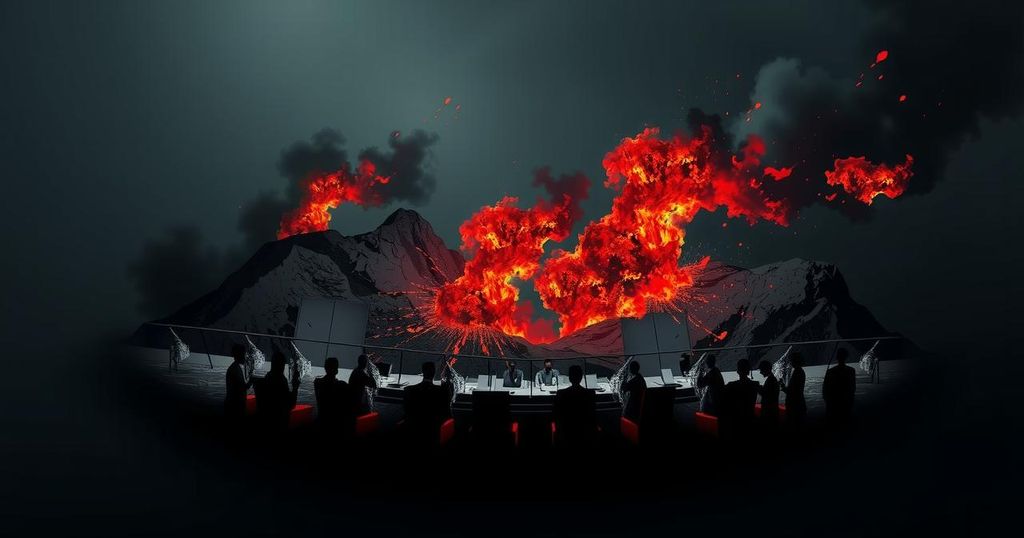The brutal war in Sudan is inflating a regional refugee crisis and escalating instability in Abyei, a contested region claimed by Sudan and South Sudan. As violence disrupts oil production and causes severe shortages of essential resources, the UN is advocating for enhanced peacekeeping measures and intercommunal dialogue. Strained relations and stalled political discussions further complicate the situation, underscoring the urgent need for international support and the deployment of police forces.
The ongoing war in Sudan is deeply affecting the region, prompting a significant refugee crisis and increasing instability in the border conflict area of Abyei, which is rich in oil resources and claimed by both Sudan and South Sudan. According to Martha Pobee, Assistant Secretary-General for Africa at the UN Department of Peace Operations, the conflict is exacerbating humanitarian conditions as both nations deal with the influx of refugees and the disruptions in oil production. Since the power struggle erupted among rival military factions last April, the resultant refugee crisis has burdened South Sudan’s already limited resources, where many refugees face severe shortages of clean water, food, and health services. The Security Council had previously authorized a peacekeeping force in Abyei back in June 2011, shortly before South Sudan gained independence. Weapons proliferation and heightened tensions have been observed, particularly with the recent occurrences of Rapid Support Forces (RSF) crossing into Abyei, as reports surfaced of violent looting in affected counties. The situation is further complicated by the movement of armed groups, along with extreme weather conditions that have displaced thousands and damaged essential infrastructure, thus raising public health concerns. The UN Interim Security Force for Abyei (UNISFA) is working to facilitate dialogue among various communities to ease tensions, especially between the Twic Mayardit and Ngok Dinka communities. However, challenges remain as leaders from the Arab Misseriya group have shown support for the RSF, and sporadic violence continues, limited only by the mobility challenges of the rainy season. Despite these tensions, UNISFA is committed to delivering vital aid and promoting long-term stability in the region. Efforts for dialogue regarding the final status of Abyei have stagnated, with the latest meetings of relevant oversight committees taking place years ago. To enhance security, the deployment of the mandated UN police forces is urgently needed. Martha Pobee has called upon the Security Council to support UNISFA’s initiatives and encourage the host nations to allow the complete deployment of the police force in Abyei, which is crucial at this time of increased necessity.
The conflict in Sudan has devolved into an intensive struggle between military factions, which has had dire humanitarian repercussions extending into neighboring South Sudan and the disputed region of Abyei. The Abyei area is particularly significant due to its oil reserves and the longstanding territorial claims from both Sudan and South Sudan. The region’s stability is critical not only to the internal dynamics of both nations but also to the broader security framework affecting the entire surrounding area. The UN’s involvement in Abyei dates back to its establishment of a peacekeeping force just prior to South Sudan’s independence in 2011, highlighting the ongoing international efforts to mitigate violence and foster peace. Continued unrest, weapon proliferation, and communal tensions complicate these efforts, necessitating continual vigilance and intervention from international peacekeeping forces. Recent events, including the RSF’s incursions into Abyei and the significant human rights and humanitarian crises resulting from conflict, have urged the UN to step up its peacekeeping measures and strive for constructive dialogue between the nations involved. The region’s precarious situation is further exacerbated by environmental factors obstructing humanitarian aid and infrastructure integrity, thus calling for urgent political and logistical solutions to restore stability.
The situation in Sudan and its implications for Abyei highlight the severe humanitarian and security challenges arising from the ongoing conflict. Continued displacement, resource shortages, and the entrenchment of armed groups reflect a complex crisis that transcends borders, necessitating prompt action from the international community. The UN must reinforce its peacekeeping presence and facilitate meaningful dialogue to address the underlying tensions. The assistance and cooperation of Security Council members are critical to deploying the full UN police force to ensure security and support humanitarian efforts in Abyei.
Original Source: news.un.org






